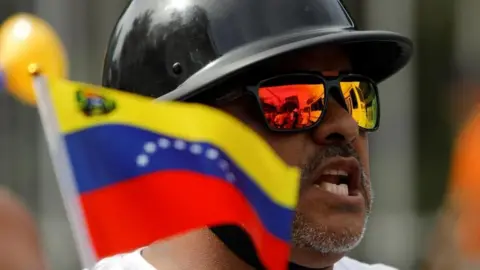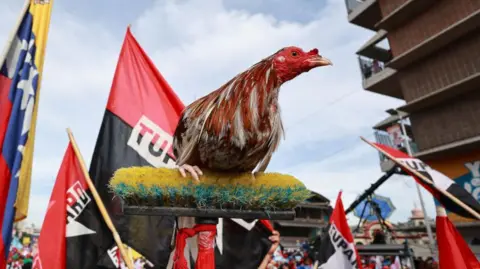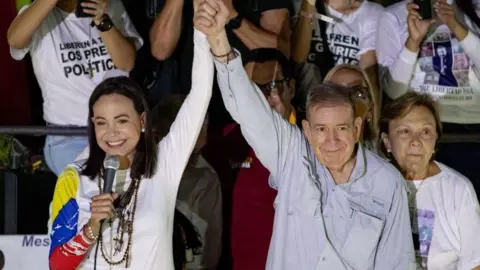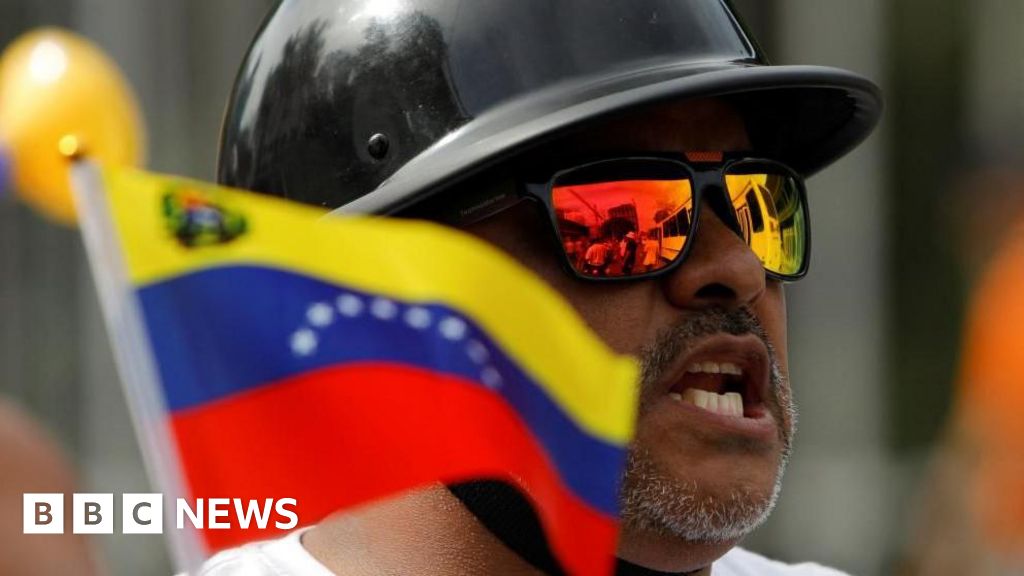 Reuters
ReutersVenezuelans will go to the polls on Sunday in what is seen as the biggest challenge facing the ruling socialist PSUV party since it came to power 25 years ago.
Nicolás Maduro, who has been president since the death of his mentor Hugo Chavez in 2013, is running for a third consecutive term.
His main challenger is former diplomat Edmundo Gonzalez, who is backed by an opposition coalition.
Polls show González with a wide lead over the incumbent, but with Maduro’s 2018 re-election widely seen as neither free nor fair, there are concerns that the election could turn out badly if it does not go his way. will be tampered with.
Those concerns are heightened by the fact that Mr Maduro has told his supporters he will win “by any means necessary”.
Additionally, the country has a very limited number of election observers monitoring the vote — four from the United Nations and a small technical team from the Carter Center.
The head of the electoral body, a close ally of President Maduro, canceled an invitation to EU observers to attend.
Former Argentine President Alberto Fernandez was also not invited because he said Maduro’s government should accept a possible electoral defeat.
Brazilian observers canceled their attendance after Maduro criticized them.
To make up for the lack of international observers, the opposition mobilized thousands of people to serve as witnesses at various polling stations.
While the opposition faces numerous obstacles – including ongoing harassment and the arrests of more than 100 people linked to its campaign since the start of the year – it has been sounding optimistic.
It believes polls show its candidate’s lead over President Maduro is so large that he cannot “steal the election.”
The government rejects the polls cited by the opposition, insisting that their candidate is in the lead.
Maduro himself used harsh language on the eve of the vote, warning of a “massacre” if he was defeated.
The statement earned him a rare rebuke from Brazil’s left-wing leader Luiz Inacio Lula da Silva, who said Mr Maduro should understand that “if you win, you stay in power, but if If you lose, you will step down.”
Mr Maduro has used the image of a fighting cock as a symbol of his campaign and struck a combative tone.
 Getty Images
Getty Images“We have weathered a thousand storms. They cannot defeat us and they never can defeat us,” he told the closing rally, referring to some of the challenges he has faced during his 11 years in power.
After his re-election in 2018, widely seen as neither free nor fair, he declared himself the legitimate president, thwarting attempts by opposition leader Juan Guaido to oust him.
While Guaidó has the support of more than 50 countries, including the United States and the European Union, Maduro can count on the loyalty of Venezuela’s security forces.
Eventually, Guaidó’s parallel government collapsed, and Maduro used it to portray himself as “the defender of Venezuela’s sovereignty,” a point he emphasized at the closing rally.
“On Sunday, we will prove it to the fascists, to the imperialists. We will shout, ‘Long live Venezuela, my beloved country,'” he said.
But despite this fiery rhetoric, many Maduro critics believe this election – the first time in more than a decade that most of the opposition has united behind a candidate and not boycotted the election – could be the catalyst for their removal Maduro’s best chance to step down.
They overcame many obstacles on their way to the polls, not least the fact that their chosen candidate, Maria Collina Machado, was barred from running for office.
Those who wanted to see a change of government rallied in record time behind her successor, 74-year-old Edmundo González.
 U.S. Environmental Protection Agency
U.S. Environmental Protection AgencyOne of the promises made by the opposition is that if it wins, it will turn the country around so that millions of Venezuelans who have fled the political and economic crisis under Maduro’s government can return.
7.8 million Venezuelans have emigrated, and polls suggest that exodus may increase if Maduro wins, meaning the election will be closely watched by the United States and Latin American countries where Venezuelans are fleeing in droves.
Cuba, China, Iran and Russia – all close allies of Mr Maduro’s government – will also be watching closely, as Mr Gonzalez’s victory is likely to cause Venezuela to realign itself away from them and towards the United States.
Mr González also told the rally of tens of thousands that it was “time to rebuild democracy” – referring to the ruling PSUV party’s 25 years in power that has taken control not only of the executive branch but also of the government. .
What worries the opposition most is that the National Electoral Council (CNE), which organized the elections and announced the results, is packed with government loyalists.
Voting will be conducted electronically and the CNE is expected to announce the results that evening, possibly as soon as 20:00 local time (01:00 BST on Monday).
Whoever wins will be sworn in on January 10, 2025.


